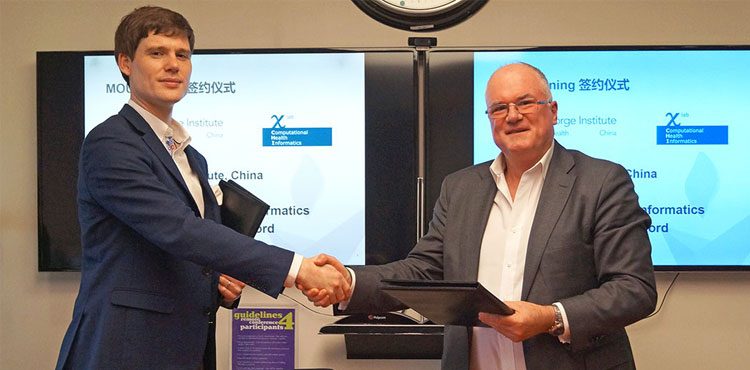
TGI China signs MOU with CHI Group, University of Oxford
On 21 May, 2018, a Memorandum of Understanding (MOU) was signed between The George Institute China (TGI China) and the Computational Health Informatics (CHI) Group of the University of Oxford.
On behalf of the respective parties, Professor Craig Anderson, Executive Director of TGI China and Professor David Clifton, Leader of CHI Group, signed the MOU to acknowledge the importance of future cooperation in digital health and big data analysis research.
Participants at the signing ceremony included Dr. Yang Yang, Senior Research Associate and Dr. Tingting Zhu, Research Fellow, both from the CHI Group, and Dr. Maoyi Tian, Head of the Digital Health Research Program at TGI China.
Professor Anderson initiated the meeting by providing an overview of current projects, and emphasized TGI China’s experience and strategic positioning in digital health. He said, “With the aim of improving the health of millions of people around the world, The George Institute for Global Health is dedicated to driving improvements in global health systems and strategy. For example, we are cooperating with CHI to develop programs that use ECG signals to predict the occurrence of heart attacks, and of older people who are at high risk of falling in the community.”
Following on, Professor David Clifton provided an update on the University of Oxford’s digital health projects and introduced recently established Oxford Suzhou Center for Advanced Research (OSCAR). He said, “As a multidisciplinary research, innovation and technology center, OSCAR cooperates with domestic Universities and research institutions, and focuses on research challenges and technologies that capitalize on our research strengths, and in particular, digital Health is one of our priorities.”
This collaboration will focus on the areas of digital health, big data and artificial intelligence in healthcare, build multidisciplinary capacity, and support the advancement of human health. There was positive discussions over the opportunities this partnership provides, and builds upon the respective strengths and emerging opportunities of both institutions.
Professor Craig Anderson commented that this new collaborative partnership could “propel development of high-quality, patient-centered, healthcare that is broadly applicable to people across the globe.”



